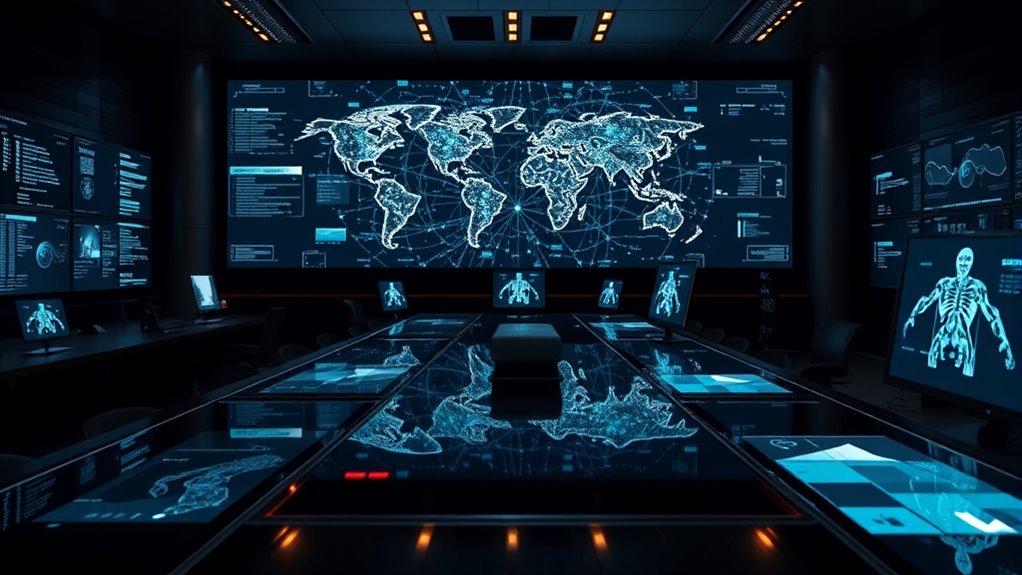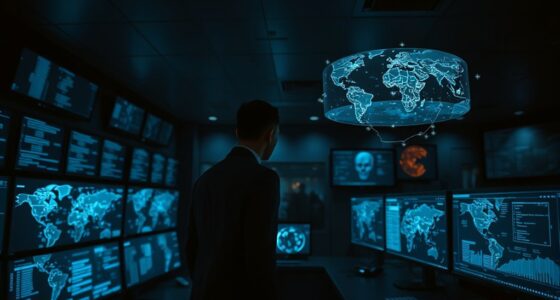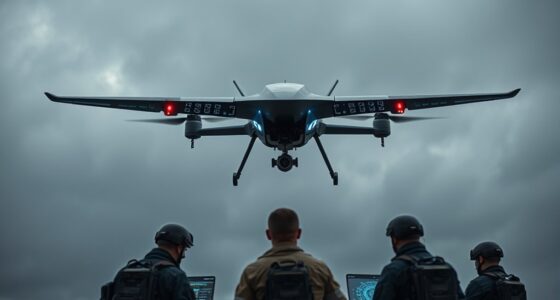The CIA is actively integrating artificial intelligence and advanced encryption to strengthen its security efforts. By adopting machine learning, it speeds up threat detection and improves accuracy, while enhanced encryption safeguards sensitive information against cyber threats. These technologies work together to create layered, adaptive defenses, ensuring operational resilience. Staff training is also a key part to keep pace with rapid technological changes. To discover how these innovations shape national security, explore further insights beneath the surface.
Key Takeaways
- The CIA is integrating machine learning to enhance threat detection and reduce false positives in intelligence analysis.
- They are adopting advanced encryption technologies, including quantum-resistant algorithms, to secure sensitive data.
- AI and encryption are combined to create layered, adaptive security systems that respond instantly to cyber threats.
- The agency invests in personnel training to manage complex AI tools and stay ahead of technological advancements.
- Strategic focus on innovation ensures CIA maintains operational superiority and resilience in the evolving AI-powered threat landscape.

In an era dominated by artificial intelligence, the CIA is ramping up its technological capabilities to stay ahead of emerging threats and enhance intelligence operations. You’re at the forefront of this transformation, where cutting-edge tools like machine learning and data encryption are reshaping how intelligence is gathered, analyzed, and protected. Machine learning, in particular, offers the agency unprecedented opportunities to sift through massive volumes of data quickly and accurately. Instead of manually analyzing countless documents, signals, and digital footprints, algorithms learn patterns and make predictions, drastically reducing the time needed for threat assessment. This allows you to identify potential risks faster while minimizing false positives, giving the agency a significant tactical edge.
Machine learning accelerates threat detection, minimizes false positives, and provides a strategic edge in modern intelligence operations.
Simultaneously, the CIA invests heavily in data encryption to secure sensitive information against cyber threats and adversaries. As you handle classified data, you’re aware that encryption acts as a digital fortress, safeguarding communication channels and stored intelligence from interception or hacking. Advances in encryption techniques—like quantum-resistant algorithms—are critical to maintaining operational security in an increasingly hostile cyber landscape. You understand that robust encryption isn’t just about protecting data but also about maintaining trust with allies and ensuring that sensitive intelligence doesn’t fall into the wrong hands. The agency’s focus on strong encryption protocols means that even if adversaries manage to breach some defenses, the information remains unintelligible without the proper keys.
Moreover, the integration of machine learning with data encryption technologies creates a layered security system that adapts to evolving threats. You see this in action when AI-driven tools automatically detect suspicious activity and trigger encryption protocols without delay. This proactive approach ensures that sensitive data remains protected at every stage—from collection to analysis and dissemination. The CIA’s push into these technologies also involves training personnel to understand and manage complex systems, ensuring that human oversight complements automated intelligence processes. You’re part of a team that’s constantly learning new skills to keep pace with rapid technological developments.
Ultimately, the agency’s focus on machine learning and data encryption reflects its commitment to leveraging innovation for national security. You recognize that these tools aren’t just about staying ahead; they’re about creating a resilient, adaptive intelligence infrastructure capable of confronting future challenges. As the AI era unfolds, the CIA’s technological push ensures you’re equipped with the most advanced capabilities to protect your country, detect threats early, and secure vital information against increasingly sophisticated enemies.
Frequently Asked Questions
How Does the CIA Ensure Ethical Use of AI Technology?
You can trust that the CIA guarantees ethical AI use through strict ethical oversight and exhaustive policy development. They actively establish clear guidelines and monitor AI deployment to prevent misuse. By implementing rigorous review processes and regularly updating policies, they aim to balance innovation with responsibility, ensuring AI technology aligns with legal standards and moral considerations. This proactive approach helps safeguard privacy, rights, and national security interests.
What Specific AI Tools Are Currently in Use at Langley?
You might not realize it, but Langley’s AI integration involves advanced tools like machine learning algorithms and natural language processing systems. These tools analyze vast data sets in real-time, uncovering patterns and insights essential for national security. Their sophisticated data analysis capabilities enable swift, informed decisions. Though secretive, it’s clear these AI tools are transforming intelligence efforts, making every piece of information more actionable and precise, all while maintaining operational secrecy.
How Does the CIA Address Ai-Related Security Vulnerabilities?
You’re likely to see the CIA prioritize AI governance and strict cybersecurity protocols to address vulnerabilities. They actively monitor AI systems, implement layered defenses, and enforce rigorous access controls. Regular audits and updates help identify and fix potential weaknesses, ensuring AI tools remain secure. By focusing on these measures, they stay ahead of threats, protecting sensitive intel and maintaining operational integrity in an evolving AI landscape.
Are There Collaborations With Private AI Companies?
Think of the CIA as a gardener collaborating with private AI companies to tend a diverse garden. They actively form public-private partnerships and develop innovation labs, fostering cutting-edge solutions. These collaborations allow you to access fresh ideas and advanced tech, ensuring national security adapts swiftly. By working with private firms, you help cultivate a resilient and innovative intelligence community, much like nurturing a thriving, evolving garden.
How Is the CIA Training Personnel in AI Technologies?
You’re trained through focused personnel training programs that emphasize AI literacy. The CIA guarantees you understand core AI concepts, ethical considerations, and practical applications. You participate in hands-on workshops, simulations, and collaborative projects with private AI companies. This thorough approach helps you stay current with emerging AI technologies, enabling you to effectively leverage AI tools in intelligence operations while maintaining ethical standards and operational security.
Conclusion
As you imagine CIA agents blending into crowds, armed with AI tools that can mimic human speech and predict behaviors, it’s ironic how technology, meant to keep us safe, feels more like a game of hide and seek. In the shadows of Langley’s tech push, you realize the line between human intuition and machine precision blurs, turning espionage into a high-stakes chess match where even the smartest AI can’t quite outsmart human unpredictability.









